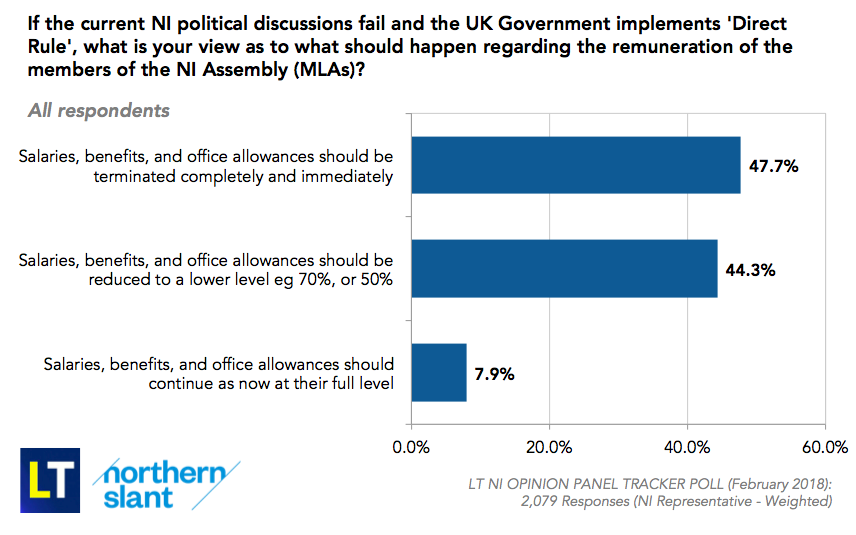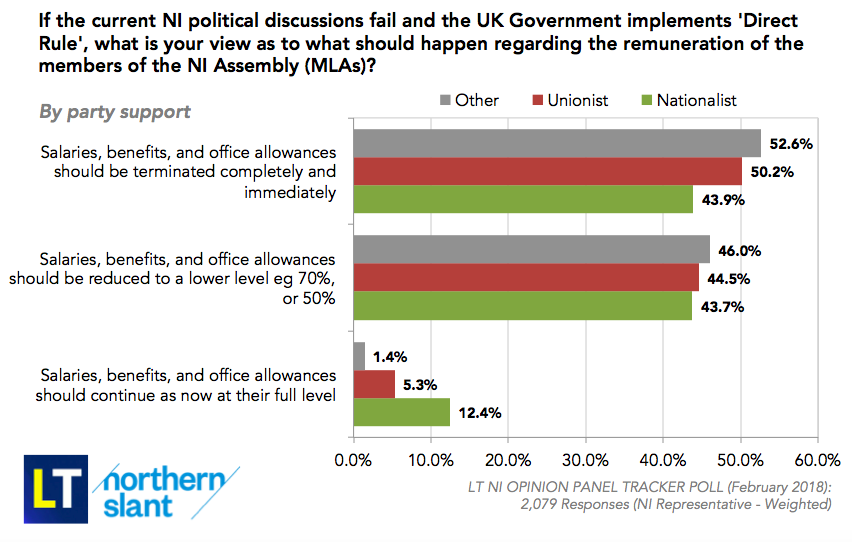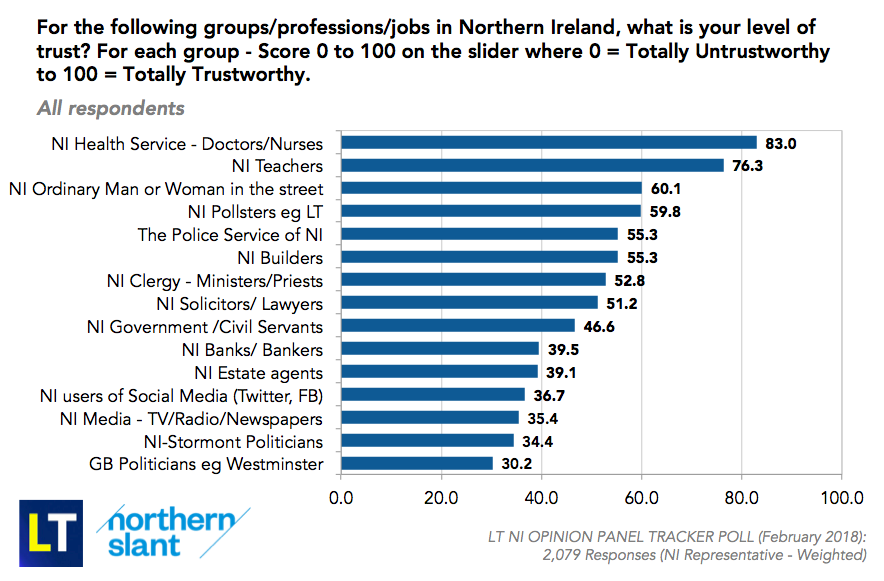Brenda from Bristol – when told of Theresa May’s decision to hold a snap general election in May last year – stated with blunt honesty, “Not another one!” I am sure many of us sympathised, given the 12 months that had led us to that point.
We had our own Brenda from Bristol moment in the aftermath of the latest Stormont talks collapsing, with one lady (Betty from Belfast?) proclaiming in an RTÉ interview that all the politicians involved should be put on a boat and thrown out to sea. I make no comment.
Certainly, one prominent feature of any recent vox pop has been the view that MLAs should no longer receive remuneration at current levels, and this was echoed in the latest LucidTalk tracker poll for Northern Ireland.
Of the all the respondents, 44.3% agreed that MLA salaries, benefits and office allowances should be reduced to a lower level, with 47.7% agreeing all salaries and benefits should be “terminated completely and immediately.”
Only 7.9% of all respondents agreed that, “Salaries, benefits and office allowances should continue as now at their full level.”
When broken down by voter affiliation, Nationalist and Republican voters were more sympathetic to those in elected office, with 12.4% agreeing that salaries, benefits and expenses should remain at their full level, compared to Unionist counterparts – only 5.3% of whom said the same thing.
Of those who identified as ‘Other’, only 1.4% agreed that salaries, benefits and allowances should stay as they are; 52.6% agreed that they should be terminated immediately (compared to 50.2% and 43.9% as voted by Unionists and Nationalists respectively).
There is no getting away from the headline figure, though, that a clear majority of respondents agree with the former chief executive of the Assembly, Trevor Reaney, who in December advised the then Secretary of State, James Brokenshire, to cut MLAs’ salaries. Simon Hamilton, during his evidence to the Northern Ireland Affairs Committee on 7th March, accepted that the issue needed to be looked at – particularly in the long-term absence of the Assembly.
It’s not quite throwing them out to sea, but cutting MLA pay – or removing it altogether – would be a big financial hit for MLAs and their office staff. It only remains to be seen how far any reduction or cut goes.
Betty from Belfast, in her interview on RTÉ, also noted that she would trust herself to do a better job at Stormont than those currently there (or not there as it happens). This too reflects LucidTalk’s polling on levels of trust in groups/professions and jobs in Northern Ireland.
Scoring out of 100 how much they trusted various groups, it was found that respondents viewed the ordinary man or woman on the street as third most trustworthy, (60.1%), just behind the top two of health service workers and teachers, who scored 83% and 76.3% respectively.
Northern Ireland’s politicians came a dismal second bottom of the list (34.4%) with only Westminster politicians scoring lower (30.2%), both being viewed as less trustworthy than media (35.4%), users of social media (36.7%), bankers (39.1%) and civil servants (46.6%).
Looking at the levels of trust from the perspectives of Unionists and Nationalists separately has its own interesting points.
Unionist respondents fairly predictably trusted Westminster politicians (41.9%) a great deal more than Nationalists (18.5%), which reflects the general election results from Northern Ireland last year, where Nationalist voters backed abstentionist candidates.
Nationalist respondents, on the other hand, trust MLAs much more than Unionists (38.6% and 32.7% respectively).
Even so, trust in politicians across all groups is relatively low. This is understandable. It follows UK and more global trends – and our own circumstances and scandal-heavy recent history. Yet we still vote for the same people, and get the same results time and time again.
Of course, when in the voting booth voters consider the individual or the party, rather than politicians as an amorphous block of people. But the fact remains that despite hardly trusting our politicians at all, we continue to put our faith in the same ones, in some sort of cognitive dissonance-fuelled self-flagellation.
Looking at the results of a similar poll conducted by Lucid Talk and published in the Belfast Telegraph in December 2016 (just before the Executive collapsed) NI politicians scored a mere 28%, coming bottom of the pile – although on that occasion there was no option for ranking Westminster politicians. An increase in trust it might be, but it will be cold comfort to MLAs, I’m sure.
A few other figures of note coming out of the polling results:
- Unionists put their faith in the clergy (57.9%) almost 10 percentage points more than Nationalists (48.1%). Unionist trust in the PSNI is also 10 percentage points higher than among Nationalists, while Nationalists’ trust in pollsters is more than 15 points greater than Unionists’.
- Nationalists trust users of social media (40.2%) much more than Unionists (33.6%), and in a somewhat counterintuitive stat, those aged over 45 trust users of social media more than over those aged between 18-44 (by almost 5 points). The wisdom of age, naiveté, or old-aged echo-chambers?
As a law graduate, who once worked for an MLA, writing about the results from pollsters to be published on social media, I’m not sure where the public’s trust in me would lie.
Further coverage of LucidTalk’s latest poll on Northern Slant
- ‘Why the DUP and Sinn Féin don’t want to compromise’ by Jamie Pow
- ‘Is this the end of the road for devolution?’ by James McMordie.
Methodology, and more on LucidTalk
Polling was carried out by Belfast based polling and market research company LucidTalk.
Polling was carried out by Belfast based polling and market research company LucidTalk. The project was carried out online for a period of 80 Hours from 1pm 23rd February 2018 to 9pm 26th February 2018 (80 Hours). The project targeted the established Northern Ireland (NI) LucidTalk online Opinion Panel (10,387 members) which is balanced by gender, age-group, area of residence, and community background, in order to be demographically representative of Northern Ireland.
3,131 full responses were received, and a data auditing process was carried out to ensure all completed poll-surveys were genuine ‘one-person, one-vote’ responses, and also to collate a robust and accurate balanced NI representative sample. This resulted in 2,079 responses being considered in terms of the final results – the results presented in this report. All data results have been weighted by gender and community background to reflect the demographic composition of Northern Ireland resulting in 2,079 responses being considered in terms of the final results. All data results produced are accurate to a margin of error of +/-3.0%, at 95% confidence.
LucidTalk is a member of all recognised professional Polling and Market Research organisations, including the UK Market Research Society (UK-MRS), the British Polling Council (BPC), and ESOMAR (European Society of Market Research organisations).
For more information, visit www.lucidtalk.co.uk and follow @LucidTalk on Twitter.



